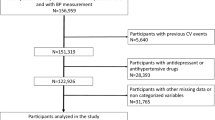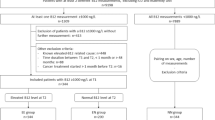Abstract
Objectives: Recent epidemiologic studies have shown an increased mortality from cardiovascular diseases in people with higher serum copper levels. Even though higher serum copper concentration in women using oral contraceptives is well known, there is still uncertainty about the influence of newer progestin compounds in oral contraceptives on serum copper concentration. This issue is of particular interest in the light of recent findings of an increased risk of venous thromboembolism in users of oral contraceptives containing newer progestins like desogestrel compared to users of other oral contraceptives.
Design: Cross-sectional epidemiologic study. Examinations included a detailed questionnaire on medical history and lifestyle factors, a seven day food record, and blood samples.
Setting: National health and nutrition survey among healthy people living in private homes in West Germany in 1987–1988.
Subjects: Nonpregnant and nonlactating women aged 18–44 y (n=610).
Results: Overall, the use of oral contraceptives was positively associated with serum copper concentration in by bi- and multivariable linear regression models with log-transformed values of serum copper concentration as dependend variable and oral contraceptive preparations and potential confounding variables as independent variables. Serum copper concentration in women using oral contraceptives varied more strongly by different progestin compounds than by estrogen contents. The highest increase of serum copper was seen in women using oral contraceptives containing antiandrogen progestins (55%; 95% CI: 37–76%), followed by desogestrel (46%; 95% CI: 36–56%), norethisteron/lynestrenol (42%; 95% CI: 29–57%), and levonorgestrel (34%; 95% CI: 24–45%).
Conclusion: While elevated serum copper concentration was found in users of all types of oral contraceptives, elevation was more pronounced among women taking oral contraceptives with antiandrogen effective progestins like antiandrogens or third generation oral contraceptives containing desogestrel. Further investigation is required to shed light on the possible role of high serum copper concentration in increasing cardiovascular or thrombotic risk of women using oral contraceptives.
Sponsorship: The national health and nutrition survey was funded by the German Ministry of Research and Technology.
This is a preview of subscription content, access via your institution
Access options
Subscribe to this journal
Receive 12 print issues and online access
$259.00 per year
only $21.58 per issue
Buy this article
- Purchase on Springer Link
- Instant access to full article PDF
Prices may be subject to local taxes which are calculated during checkout
Similar content being viewed by others
Author information
Authors and Affiliations
Rights and permissions
About this article
Cite this article
Berg, G., Kohlmeier, L. & Brenner, H. Effect of oral contraceptive progestins on serum copper concentration. Eur J Clin Nutr 52, 711–715 (1998). https://doi.org/10.1038/sj.ejcn.1600631
Received:
Accepted:
Published:
Issue Date:
DOI: https://doi.org/10.1038/sj.ejcn.1600631



